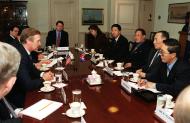Chi uscì con Kim Jong-il?
Song Hye-rim ha datato Kim Jong-il dal al . La differenza di età era di 4 anni, 0 mesi e 23 giorni.
Ko Yong-hui ha datato Kim Jong-il dal al . La differenza di età era di 11 anni, 4 mesi e 10 giorni.
Kim Ok ha datato Kim Jong-il dal al . La differenza di età era di 23 anni, 6 mesi e 12 giorni.
Kim Jong-il

Kim Jong Il (born Yuri Kim; 16 February 1941 or 1942 – 17 December 2011) was a North Korean politician and dictator who was the second supreme leader of North Korea from the death of his father Kim Il Sung in 1994 until his death in 2011. Posthumously, Kim Jong Il was declared Eternal General Secretary of the Workers' Party of Korea (WPK).
In the early 1980s, Kim had become the heir apparent for the leadership of North Korea, thus being established the Kim family, and he assumed important posts in party and army organizations. Kim succeeded his father and founder of North Korea, Kim Il Sung, following his death in 1994. Kim was the General Secretary of the WPK, WPK Presidium, WPK Central Military Commission, Chairman of the National Defence Commission (NDC) of North Korea and the Supreme Commander of the Korean People's Army (KPA), the fourth-largest standing army in the world.
Kim ruled North Korea as a repressive and totalitarian dictatorship. Kim assumed leadership during a period of catastrophic economic crisis amidst the dissolution of the Soviet Union, on which it was heavily dependent for trade in food and other supplies, which brought a famine. While the famine had ended by the late 1990s, food scarcity continued to be a problem throughout his tenure. Kim strengthened the role of the military by his Songun ("military-first") policies, making the army the central organizer of civil society. Kim's rule also saw tentative economic reforms, including the opening of the Kaesong Industrial Park in 2003. Under his leadership, North Korea conducted its first nuclear test in October 2006, obtaining nuclear weapons. In April 2009, North Korea's constitution was amended to refer to him and his successors as the "supreme leader of the DPRK".
The most common colloquial title given to Kim during his lifetime was "Dear Leader" to distinguish him from his father Kim Il Sung, the "Great Leader". Following Kim's failure to appear at important public events in 2008, foreign observers assumed that Kim had either fallen seriously ill or died. On 19 December 2011, the North Korean government announced that he had died two days earlier, whereupon his third son, Kim Jong Un, was promoted to a senior position in the ruling WPK and succeeded him. After his death, alongside "Eternal General Secretary" of the WPK, Kim Jong Il was declared "Eternal Chairman" of the now defunct National Defence Commission, in keeping with the tradition of establishing eternal posts for the dead members of the Kim dynasty. North Korean media also began referring to Kim as "the General" (장군 Changgun), similar to his father's posthumous designation as "the [eternal] President".
Per saperne di più...Song Hye-rim
Song Hye-rim (Korean: 성혜림; 24 January 1939 – 18 May 2002) was a North Korean actress, best known for being the one-time favored mistress of Kim Jong Il.
Per saperne di più...Kim Jong-il

Ko Yong-hui
Ko Young-hui (Osaka, 26 giugno 1952 – Villejuif, 24 maggio 2004) è stata una ballerina nordcoreana di origine giapponese, terza moglie di Kim Jong-il, defunto dittatore della Corea del Nord.
Per saperne di più...Kim Jong-il

Kim Ok

Kim Ok (김옥?, 金玉?, Gim OkLR, Kim OkMR) (Corea del Nord, 24 agosto 1964) è una politica nordcoreana.
Per saperne di più...